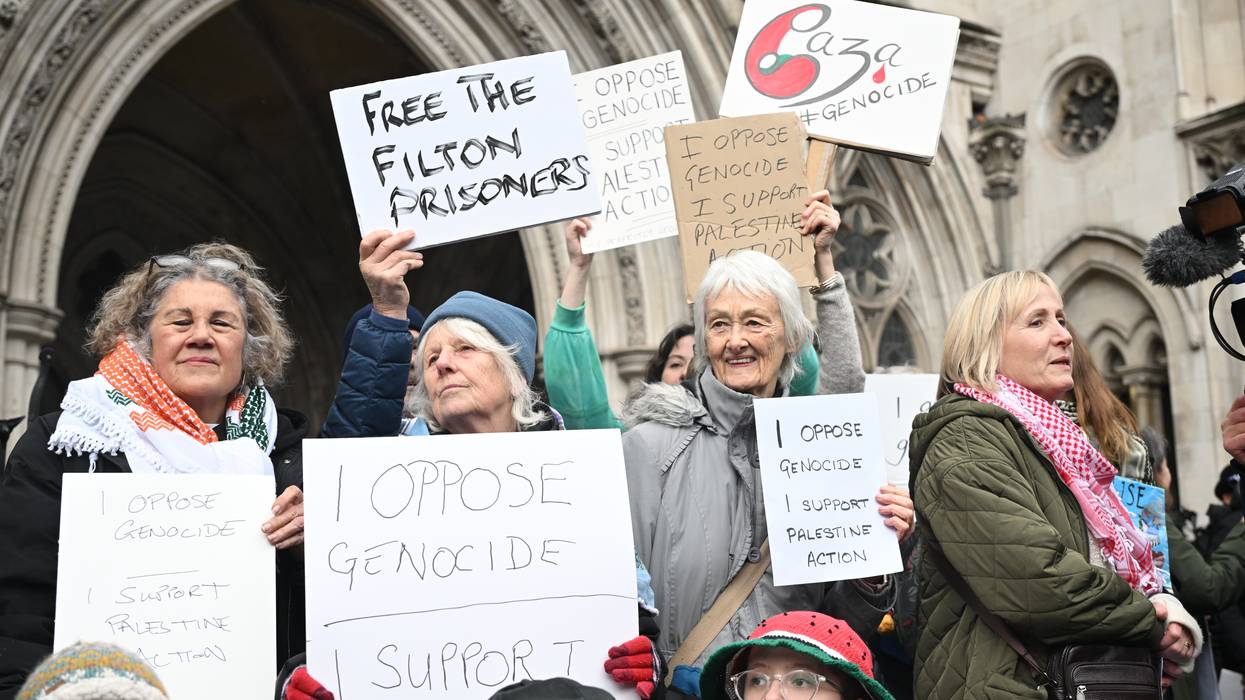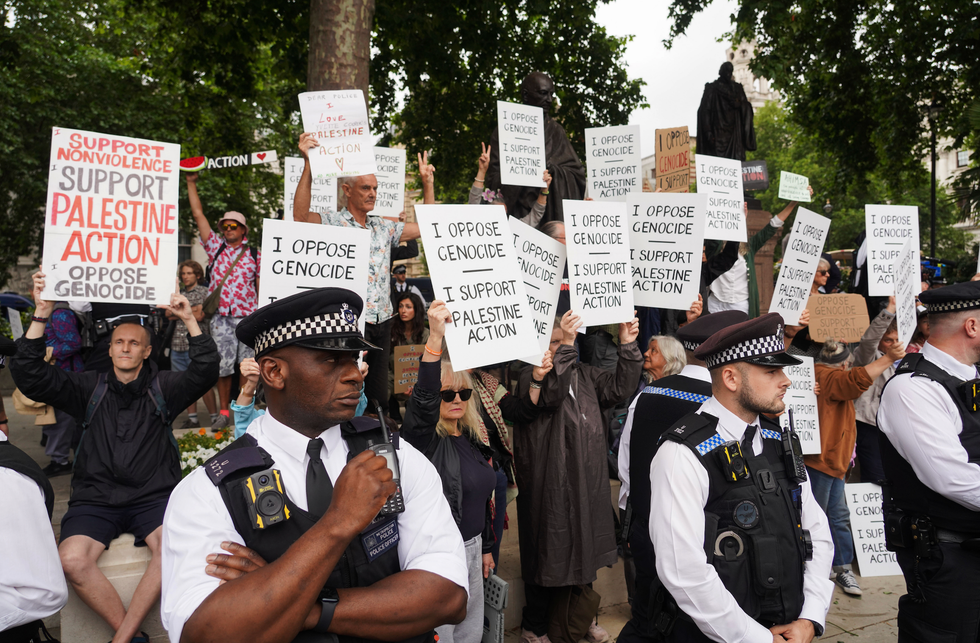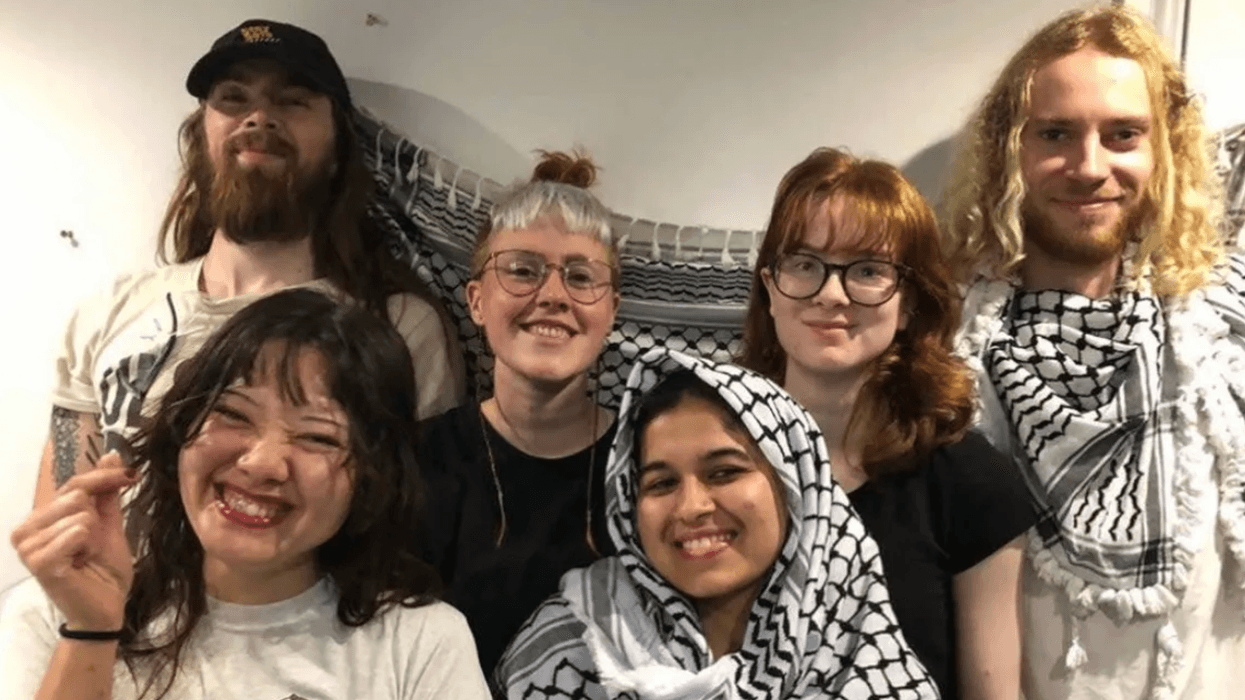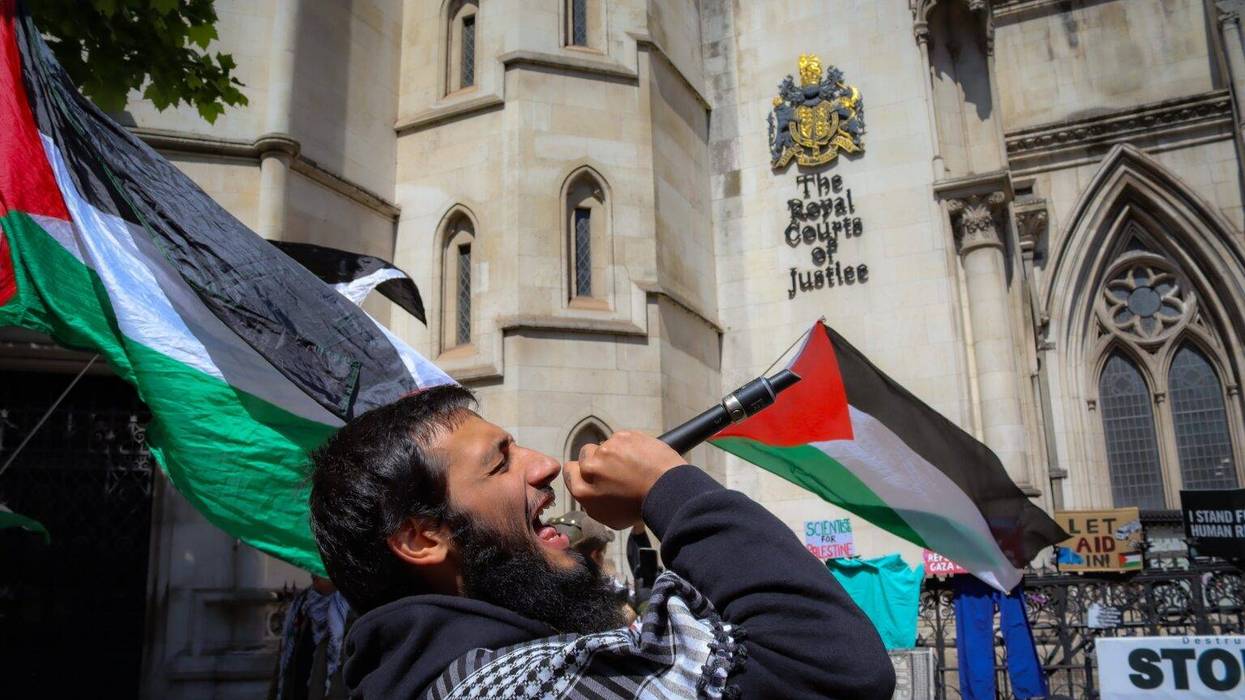Prosecutors alleged that the six activists drove a van like a "battering ram" to smash their way into the Elbit Systems UK research, development, and manufacturing facility in Bristol early on August 6, 2024 in a "meticulously organized" attack targeting the subsidiary of the Israeli arms firm Elbit Systems.
The defendants—who had been imprisoned on remand for 17 months—were also accused of using fire extinguishers to spray red paint throughout the facility and of using crowbars and hammers to break computers and other equipment.
The activists admitted to breaking into the facility, only disputing that the sledgehammers were offensive weapons and arguing that they were only meant to damage property.
After the verdicts were announced, the courtroom erupted in cheers and the six cleared activists hugged in the dock.
“These verdicts are a huge blow to government ministers who have tried to portray Palestine Action as a violent group to justify banning it under badly drafted terrorism legislation," said a spokesperson for the group Defend Our Juries, which has organized numerous protests in support of Palestine Action.
“Despite government efforts to prejudice this trial, citing the allegations of violence to justify treating Palestine Action as ‘terrorists’, as if they were already proved, the jury which heard the evidence has refused to find the defendants guilty of anything, not even criminal damage," the spokesperson added. "It shows how out of step this government is with public opinion, which is revulsed by the government and Elbit’s complicity in genocide.”
The jury failed to reach a verdict on an additional charge against Corner, who allegedly caused grievous bodily harm by hitting Police Sgt. Kate Evans in the back with a sledgehammer as she laid on the floor, fracturing her spine.
Journalist Adam Ramsay pointed out that Corner's altercation with Evans "was widely used to justify the proscription of Palestine Action."
"The fact that the jury, who heard the full story, didn’t convict him of a crime leaves the case for proscription in tatters," Ramsay added.
Corner—and possibly other defendants—could face new trials on certain charges if the Crown Prosecution Service determines that there is a realistic chance of conviction and if further action serves the public interest.
Eighteen other alleged Palestine Action members are currently awaiting trials scheduled for later this year.
Numerous observers said the verdicts obliterate the government's rationale for banning Palestine Action under the highly contentious Terrorism Act of 2000.
"I'm not sure people appreciate quite what a blow to [UK Prime Minister Keir] Starmer's government the acquittal of the Palestine Action protestors is," East Anglia Law School professor Paul Bernal said on Bluesky. "It both blows apart the whole proscription idea and demonstrates how out of touch they are."
"This was a jury," Bernal added. "Juries represent the public."
Journalist Jonathan Cook noted that "the UK government pinned its case for declaring Palestine Action a terrorist organization largely on the trial of the so-called Filton Six, claiming they had proved the group to be violent. A jury today found none of them guilty of any of the charges."
A declassified UK intelligence report published last September by the New York Times acknowledged that “the majority” of Palestine Action’s activities “would not be classified as terrorism” under the country's highly contentious Terrorism Act of 2000.
In addition to the Filton break-in, Palestine Action's direct action protests have also including spray-painting warplanes at a British military base and defacing US President Donald Trump’s Turnberry golf resort in Scotland—acts experts say do not constitute terrorism.
Britain's Terrorism Act has long been condemned by civil liberties defenders, who decry the law’s “vague and overbroad” definition of terrorism, chilling effect on free speech and expression, invasive stop-and-search powers, pre-charge detention and control orders, sweeping surveillance and data collection, and other provisions.
According to rights groups, more than 2,700 people have been arrested during demonstrations of support for Palestine Action since the group’s proscription. Many of those arrested did nothing more than hold up signs reading: “I Oppose Genocide. I Support Palestine Action.”
Arrestees include many elders, including 83-year-old Rev. Sue Parfitt, who argued that “we cannot be bystanders” in the face of Israel’s US and UK-backed genocide in Gaza, which has left more than 250,000 Palestinians dead, maimed, or missing; nearly 2 million people forcibly displaced; and hundreds of thousands starved by design.
Last September, a panel of United Nations experts concluded that Israel is committing genocide in Gaza. The International Court of Justice (ICJ) in The Hague is currently reviewing a genocide case filed against Israel by South Africa.
The International Criminal Court (ICC), also located in the Dutch city, issued warrants in November 2024 for the arrest of Israeli Prime Minister Benjamin Netanyahu and former Defense Minister Yoav Gallant for alleged crimes against humanity and war crimes committed during the 27-month assault and siege on Gaza.
Numerous Palestine Action members and supporters have gone on a monthslong life-threatening hunger strike to protest the defendants' imprisonment on remand and to demand a fair trial, lifting of the ban on Palestine Action, and closure of Elbit Systems’ UK facilities.
Late last month, Muhammad Umer Khalid, the last of the Palestine Action hunger strikers, began eating again after he was hospitalized with multiple organ failure.
Naila Ahmed, head of campaigns at CAGE International, said in a statement Wednesday that the Filton verdicts are "a powerful affirmation of jury independence and moral courage in the face of extraordinary political pressure."
"Though they cannot get back the 17 months of their life taken from them unlawfully, they should all be compensated and the remaining 18 defendants of the Filton 24 should also be released on bail," she added. "This case was used to justify the ban against Palestine Action, a decision that should now be overturned."



 Members of the group Defend Our Juries publicly declare their opposition to Israel's genocidal assault on
Members of the group Defend Our Juries publicly declare their opposition to Israel's genocidal assault on 
